As inbound marketers, content plays an important role in attracting attention and building trust with prospects. Our content can come in many different formats, and the format we choose can speak volumes about the research and ideas within.
Interactive content has become increasingly more popular as brands try to cut through the noise and keep prospects' attention long enough to deliver a message.
What Is Interactive Content?
Interactive content is a type of content created not just for consumption but also engagement. It's designed to prompt action and participation from the audience.
The benefit being a higher likelihood of harnessing the audience's ever-decreasing attention span by publishing stories with interactive elements so they gain an active role in consuming information. By dazzling the audience with an unexpected experience, you can increase engagement, on-site dwell time, and social share rates.
Types of Interactive Content
- Quizzes
- Interactive Video
- Surveys and Polls
- Calculators
- Gamified Content
In theory, any type of content can incorporate interactive elements. Interactive marketing requires ingenuity and innovation, and here are some of the ways interactive content currently shows up on the web:
Quizzes
By their very nature, quizzes are interactive since input is required from the audience in exchange for valuable personalized content.
Interactive Infographics
Unlike static infographics, interactive infographics prompt the audience to take their own journey through the information being presented.
Interactive Video
Video viewing is often a passive activity, but interactive videos can improve engagement and enhance the experience. This is done by adding 360 views, audience controls, or embedded content and interactivity.
Surveys and Polls
If the audience wants macro data on a particular topic, they can be incentivized to take a survey. Then, both the survey (the input) and its results (your output) becomes consumable pieces of content.
Calculators
In many cases, information itself may not be useful for your audience but rather how that information can be applied to their individual situation.
Gamified Content
One of the best ways to turn content into an experience is by making it a game. Examples of this include playable game ads or interactive worlds.
You're not confined to just these buckets, either. Interactive content is limited only by your imagination.
Interactive Content Examples from Real Brands
Each industry poses its own obstacles and unique characteristics, but share one common denominator: Interactive content works for all topics and audiences.
1. HubSpot's Website Grader
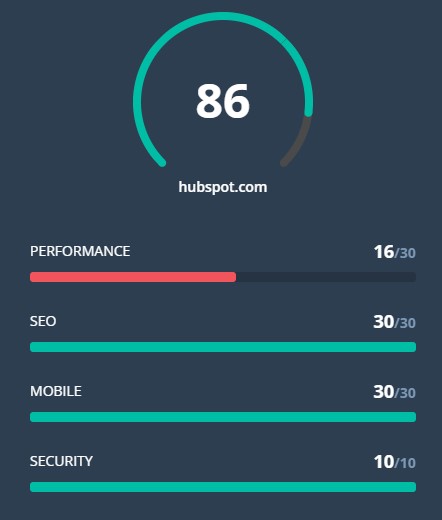
This personalized web experience allows users to type in their website and receive a detailed analysis based on different criteria. By pointing out specific pain points and providing actionable tips, the content turns into a lead-generator, getting the conversation between HubSpot and potential users started.
How can you incorporate this into your content marketing? Personalization is key for building relationships with your audience. Pointing out opportunities for improvement and growth in an interactive way increases the trust your readers have that your brand is an expert in this topic and industry, which is easily done through interactivity. Think: “Show, don’t tell.
2. The Wall Street Journal

Delivering a large amount of information is a challenge for content creators. This example from the Wall Street Journal does so using searchable, visual stats. The facts are arranged in a number of ways, including a recorded timeline for readers to hit “play” and simply watch.
How can you incorporate this into your content marketing? Search is an interactive action on its own and can be easily incorporated into your content. Using search provides readers with a task to keep them engaged while presenting a healthy amount of information in a positive manner. Adding search options very much depends on the content you create, but tools like FlippingBook and Viostream make even PDF and video content searchable.
3. National Geographic
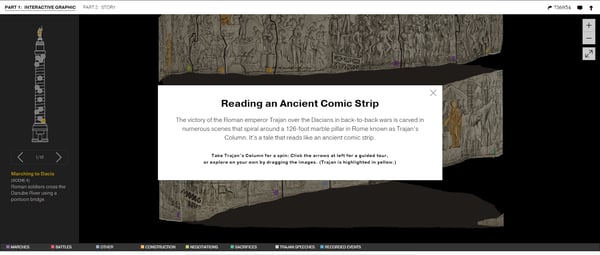
Some of the most inspiring forms of interactive content match the topics they address. This example allows readers to follow the ancient cave paintings as if they are touring a prehistoric cave, with color-coded topics to provide insights.
How can you incorporate this into your content marketing? Making history come to life can be a hard task. Don’t shy away from numbers and important facts, but don’t skimp on the imagery and engagement, either. Leave the canvas clear for creative imagery and video, while the text wraps the visuals but does not interfere.
4. Information is Beautiful
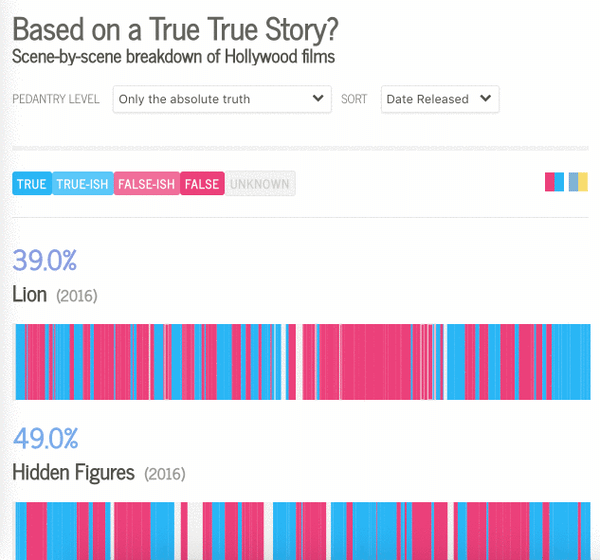
Viewers love trivia about their favorite movies, and this is a visually appealing way to serve it to them. Breaking the movie down into specific scenes clarifies which parts are based on a true story, while color-coding gives readers a broader overview.
How can you incorporate this into your content marketing? For a more holistic reading experience, allow readers to go back-and-forth between the small details and the big picture.
5. CNBC
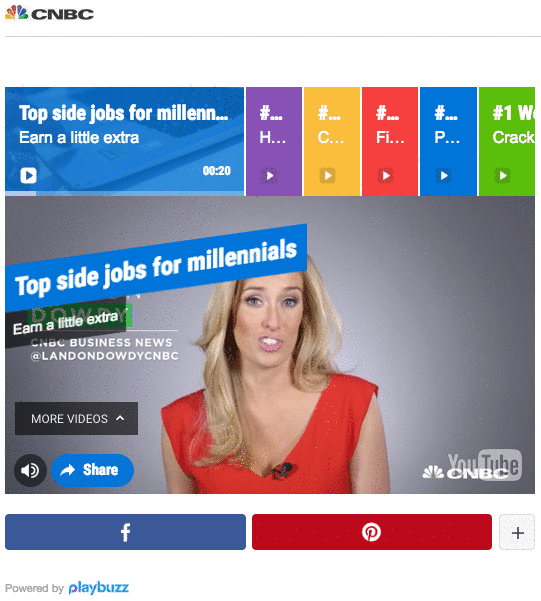
Adapting listicles to the age of video can be done by dividing a lengthy clip into Video Snaps. Each snap can be edited from a different video, and is assigned a customized title and color. Once viewed, readers can share the snap (or in this case, perhaps the side job) they enjoyed most on their social channels, or the entire article.
How can you incorporate this into your content marketing? Instead of including full-length videos, cut to the chase (literally) and only include the parts that are truly instrumental to your message. Gone are the days of “skip to 1:32 to view this” video content.
6. The Solutions Project
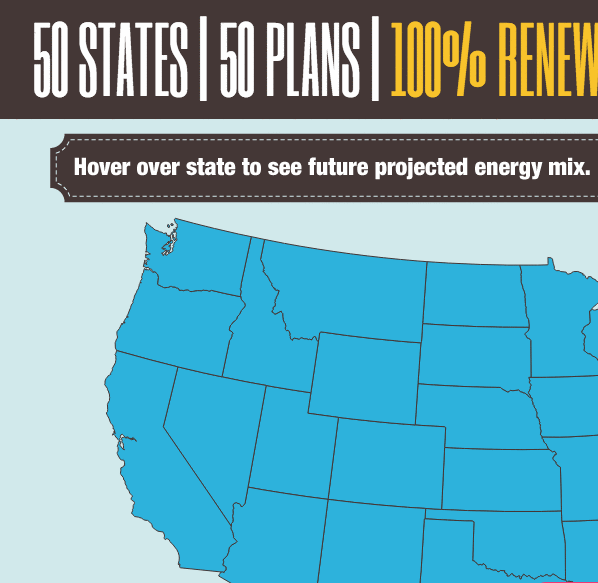
This interactive map presents data when hovering over specific states, and dives into the stats after clicking. This makes information that much more accessible, and gives readers the option to discover more, if they choose to do so.
How can you incorporate this into your content marketing? For presenting a geographic distribution of data, create a interactive map to help readers visualize the topic. Check out free tools like Mapme and MapMaker Interactive to create your own. Using icons and uplifting design elements makes complicated topics seem more digestible.
7. Crown Courtroom
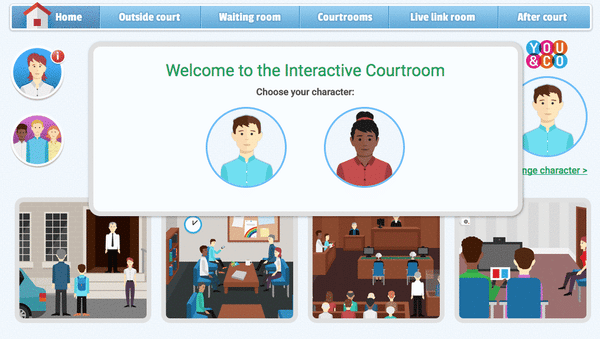
This interactive animation aims (and succeeds) at educating readers about a potentially intimidating experience in a friendly, gamified and comprehensible way. Viewers can choose a character to represent them in a mock courtroom and learn about various court-related situations.
How can you incorporate this into your content marketing? Simplify complex topics for readers with a combination of gamification and snackable insights. Animate a relevant scenario and personalize the content by allowing the reader to customize their own “character.”
8. Robbi Leonardi
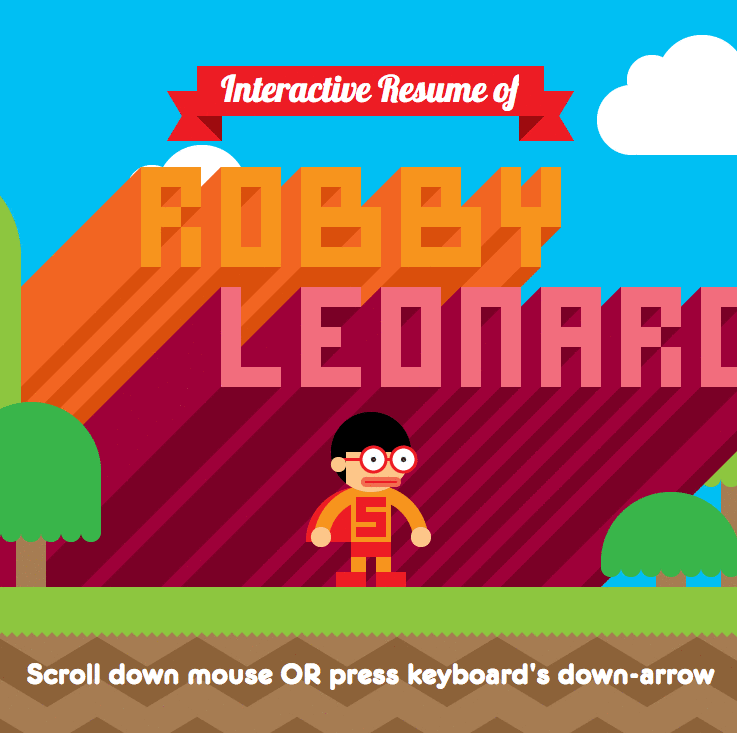
What better way to demonstrate interactive design skills than by crafting a brilliantly designed, interactive CV? Designer Robby Leonardi made some noise with his groundbreaking approach to job hunting, creating an animated “game” where his skills and experience are the main components.
How can you incorporate this into your content marketing? If you happen to be looking for your next adventure, Leonardi should inspire you to be creative and daring. If not, notice the clever use of animation and the consistent narrative that ties images and text together. To add animation to your content, try these free tools: PowToon and Animaker.
How to Get Started with Interactive Storytelling
If you’re new to creating digital content, start small with a simple quiz or interactive infographic. These assets perform well at the top of the funnel because they motivate the user to share and see how their peers stack up against their own experience.
When it’s time to build something more sophisticated, consider working with a developer to determine how to build the user experience and interactive elements you’re looking for.
Experiment with new formats, topics, and which stage in the buyer’s journey your content serves. That means release early and often so you’re consistently collecting feedback and iterating on your interactive content.
No comments:
Post a Comment